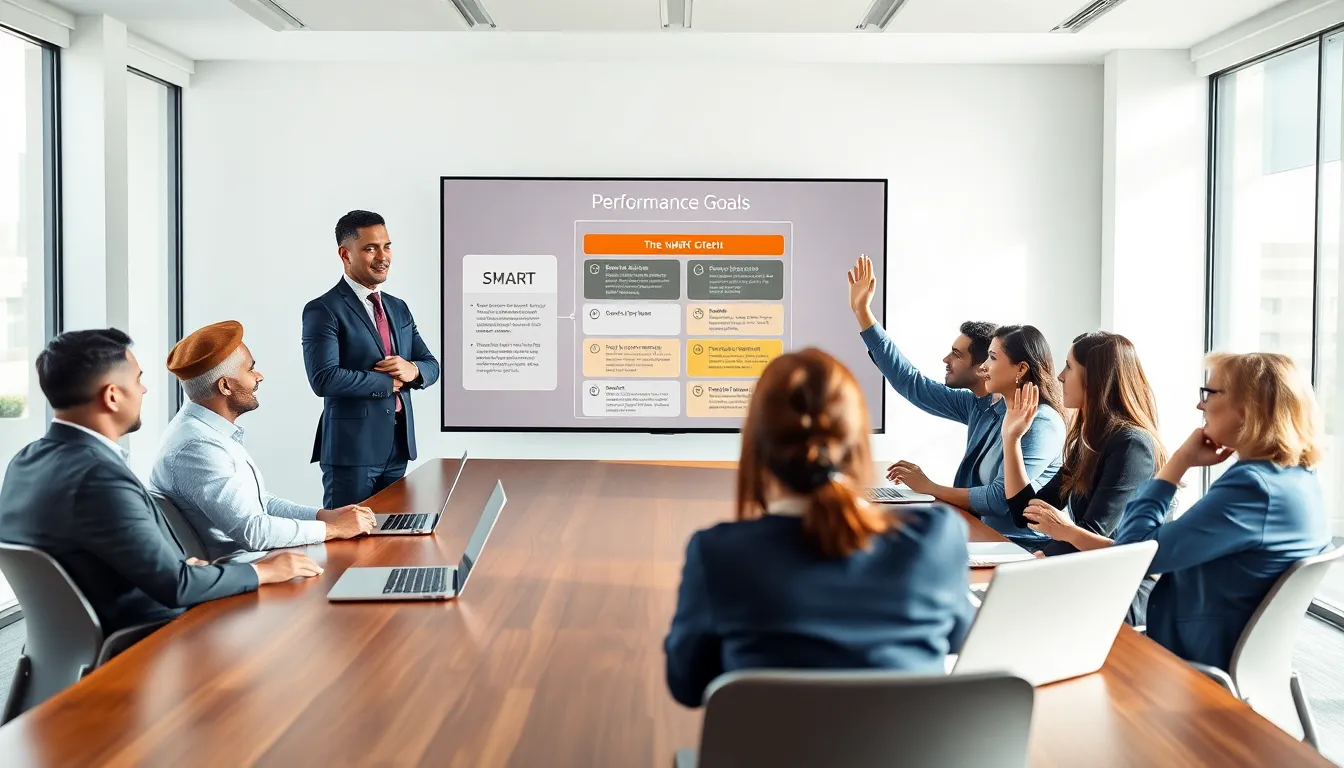In a world where everyone wants to be the boss but few know how to lead, the art of leadership enhancement is like finding the last piece of pizza at a party—everyone wants it, but only a select few can savor it. Effective leadership isn’t just about barking orders; it’s about inspiring others, fostering innovation, and maybe even cracking a joke or two to lighten the mood.
Imagine a workplace where leaders don’t just manage but motivate, where team members don’t just follow but flourish. That’s the magic of enhancing leadership skills. Whether you’re a seasoned pro looking to polish your approach or a newbie eager to step up, the journey to becoming a better leader is filled with opportunities for growth, laughter, and maybe even a few awkward moments. Let’s dive into the essentials of leadership enhancement and discover how to turn those moments into stepping stones for success.
Table of Contents
ToggleUnderstanding Leadership Enhancement
Leadership enhancement focuses on developing skills that inspire and motivate others. Cultivating effective leadership strategies enables individuals to transform challenges into opportunities for growth.
Definition and Importance
Leadership enhancement refers to the continuous process of improving one’s ability to guide and influence others. It plays a significant role in organizational success as enhanced leaders contribute to higher team morale and productivity. The importance of leadership enhancement grows as organizations face evolving challenges. With effective leadership, teams navigate complexities and maintain focus on goals. Leaders committed to improvement foster an environment that encourages team members to excel.
Key Characteristics of Effective Leaders
Effective leaders demonstrate several key characteristics vital for success. First, they communicate clearly, ensuring everyone understands their vision. Next, emotional intelligence allows them to connect with team members and manage conflicts well. Additionally, adaptability helps them respond positively to changing circumstances. Strong decision-making skills enable leaders to assess situations quickly and choose beneficial actions. They also exhibit integrity by leading with honesty and gaining their team’s trust. Finally, effective leaders inspire others by recognizing achievements and encouraging growth.
Techniques for Leadership Enhancement

Effective leadership enhancement involves a variety of techniques that help individuals grow in their roles. Two essential strategies in this process include coaching and mentoring, as well as continuous learning and development.
Coaching and Mentoring
Coaching and mentoring play vital roles in leadership enhancement. Both approaches provide guidance and support tailored to the individual’s needs. Mentors share their experiences and insights, helping leaders navigate challenges effectively. Coaches often focus on specific skills, offering targeted feedback that fosters growth. These relationships create opportunities for leaders to reflect, set goals, and track progress. Establishing trust and openness between the mentor, coach, and the leader leads to meaningful conversations. Books, workshops, and one-on-one sessions frequently serve as valuable resources in these learning journeys.
Continuous Learning and Development
Continuous learning and development are critical for effective leaders. Engaging in ongoing education promotes adaptability and resilience in a fast-paced environment. Leaders should participate in workshops, online courses, or industry conferences to stay informed about new trends. Additionally, reading books and articles from thought leaders enhances knowledge and perspective. Incorporating feedback from team members helps identify areas for improvement. This commitment to growth fosters an agile mindset, allowing leaders to respond effectively to challenges. As a result, the continuous evolution of leadership skills becomes an integral part of a leader’s journey.
The Role of Feedback in Leadership Enhancement
Feedback plays a pivotal role in leadership enhancement. It fosters growth and encourages self-awareness among leaders.
Implementing Feedback Loops
Implementing feedback loops ensures continuous improvement in leadership practices. These loops create structured opportunities to gather input from team members. Regular check-ins promote open communication and build trust. The process encourages leaders to adapt their strategies based on real-time insights from their teams. Leaders can then refine their approach, focusing on what truly resonates with their team members. With a consistent feedback mechanism, leaders enhance their decision-making skills and align their goals with team expectations.
The Importance of Constructive Criticism
Constructive criticism drives significant growth for both leaders and their teams. It provides specific insights rather than vague statements, enabling leaders to understand areas for improvement. Team members benefit from constructive feedback as it clarifies expectations and fosters accountability. Emphasis on positive language creates a supportive environment. When leaders invite constructive criticism, they cultivate a culture of openness and innovation. This approach not only strengthens relationships but also enhances team performance, as individuals feel valued and understood. Prioritizing constructive criticism leads to better collaboration and a more engaged workforce.
Tools and Resources for Leadership Enhancement
Various tools and resources exist to assist in enhancing leadership skills. Utilizing these resources fosters growth and adaptability in a leader’s journey.
Online Courses and Workshops
Online courses and workshops offer structured learning experiences. Leaders can gain insights from experts and interact with peers. Platforms like Coursera and LinkedIn Learning provide specialized courses focusing on emotional intelligence, decision-making, and team dynamics. Engaging in immersive workshops can deepen understanding and practical application of leadership theories. Many organizations also host leadership seminars that allow for networking opportunities and real-time feedback from experienced facilitators. Enrolling in these programs enhances knowledge and equips leaders with actionable strategies for real-world scenarios.
Books and Articles on Leadership
Books and articles create opportunities for deep dives into leadership concepts. Titles such as “Leaders Eat Last” by Simon Sinek and “Dare to Lead” by Brené Brown highlight crucial traits and skills. Reading widely expands perspectives on effective leadership practices. Articles from reputable sources like Harvard Business Review and Forbes provide insights into current trends and challenges in leadership. Consuming diverse literature sharpens critical thinking and reflective practices. Staying informed through various publications ensures leaders remain relevant and effective as they navigate evolving organizational landscapes.
Leadership enhancement is a vital pursuit for anyone looking to make a meaningful impact. By focusing on continuous improvement and embracing feedback leaders can cultivate an environment of trust and collaboration. This commitment not only strengthens their own capabilities but also uplifts their teams, driving greater engagement and productivity.
As the landscape of leadership evolves it’s essential for leaders to adapt and refine their skills. Utilizing available resources such as online courses and insightful literature can provide the necessary tools for growth. Ultimately, the journey of enhancing leadership skills is ongoing and rewarding, paving the way for success in any organization.





